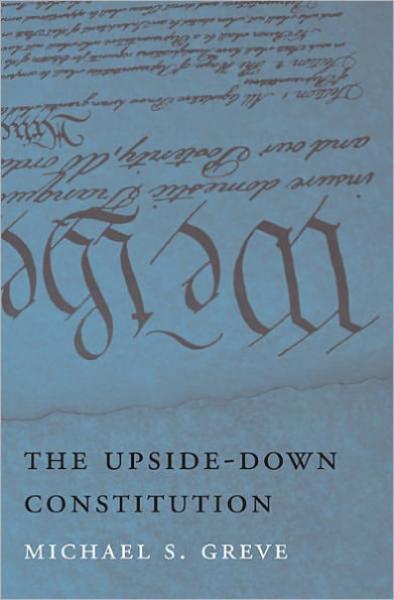Description
Over the course of the nation's history, the Constitution has been turned upside-down, Michael Greve argues in this provocative book. The Constitution's vision of a federalism in which local, state, and federal government compete to satisfy the preferences of individuals has given way to a cooperative, cartelized federalism that enables interest groups to leverage power at every level for their own benefit. Greve traces this inversion from the Constitution's founding through today, dispelling much received wisdom along the way.
The Upside-Down Constitution shows how federalism's transformation was a response to states' demands, not an imposition on them. From the nineteenth-century judicial elaboration of a competitive federal order, to the New Deal transformation, to the contemporary Supreme Court's impoverished understanding of constitutional structure, and the "devolution" in vogue today, Greve describes a trend that will lead to more government and fiscal profligacy, not less. Taking aim at both the progressive heirs of the New Deal and the vocal originalists of our own time, The Upside-Down Constitution explains why the current fiscal crisis will soon compel a fundamental renegotiation of a new federalism grounded in constitutional principles.
The Constitution's vision of federalism in which local, state, and federal government compete to satisfy preferences of individuals has given way to a cooperative, cartelized federalism that enables interest groups to leverage power at every level for their own benefit. Greve traces this inversion and dispels much received wisdom along the way.
Michael S. Greve is the John G. Searle Scholar at the American Enterprise Institute for Public Policy Research.
Greve portrays an ever-increasing trend that will lead to more and more government and to greater fiscal recklessness. He approaches his subject from a historical perspective and with careful systematic documentation. In a very well-written concluding essay, the author discusses where the nation is at the current moment and offers solutions to the current situation.-- (08/01/2012)
If there is to be a recovery of the Constitution's federalism, it will involve a retreat by the federal courts from the culture wars and, simultaneously, a renewed commitment by them to policing the boundaries of state authority over national commerce. A precondition for any such recovery is the conservative intellectual reorientation that Greve is attempting to advance. Thoughtful conservatives understand, as he notes, that the free market is not the same thing as "the opportunistic demands of the Fortune 500." They ought to begin distinguishing as well between federalism and the desires of state governments.-- (03/26/2012)
The Upside-Down Constitution tackles in a fast-paced and no-nonsense style the full range of issues that surround the transformation of American federalism from the founding period to today. No naive originalist, and no free-form modernist, Greve skillfully shows how the original plan that supported competitive federalism has given way to a misguided New Deal synthesis that works to enrich politicians at all levels of government at the expense of the ordinary individuals whom our Constitution was intended, today as always, to protect.--Richard A. Epstein, author of Design for Liberty
Michael Greve has written the best book on American federalism in years. One need not agree with his general argument in order to find constant stimulation and illumination in every chapter. No one interested in American constitutional development (and its future) can afford to ignore this book.--Sanford Levinson, author of Framed: America's 51 Constitutions and the Crisis of Governance
Michael Greve is one of the most creative thinkers today about the Constitution's deep structures. In this remarkable reinterpretation of American federalism, he argues that competition between states is central to the Constitution's political goals. This brilliant book will turn your complacent conceptions about the American Constitution upside down.--Jack M. Balkin, author of Living Originalism and Constitutional Redemption
Political events and extraordinary scholars have made this a golden age of argument about the Constitution. One of those scholars, Michael Greve, argues that promoting federalism--in the conventional sense of states' rights or the Tenth Amendment--may promote a greater quantity and poorer quality of government. This may seem counterintuitive, particularly to conservatives, but not to those who remember why various states' policies convinced James Madison that the Articles of Confederation had to be replaced by the Constitution.--George F. Will
A learned, yet eye-opening and provocative analysis of one of the perpetual dilemmas of our federal system. Mr. Greve's quite significant contribution to our understanding of this complex subject will cause considerable rethinking of much conventional wisdom and deeply rooted dogma.--Theodore B. Olson
Marvelous and challenging.--Mario Loyola"National Review online" (06/29/2012)
Product Details
- Harvard Brand
- Feb 29, 2012 Pub Date:
- 0674061918 ISBN-10:
- 9780674061910 ISBN-13:
- 518 Pages
- 9.3 in * 6.5 in * 1.4 in Dimensions:
- 2 lb Weight:




